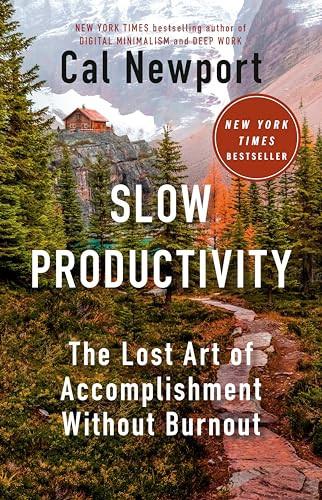Matt Jahantark's Key Ideas from Slow Productivity
by Cal Newport
Ideas, facts & insights covering these topics:
10 ideas
·9.46K reads
54
3
Explore the World's Best Ideas
Join today and uncover 100+ curated journeys from 50+ topics. Unlock access to our mobile app with extensive features.
Slow Productivity is a term coined by Cal Newport, an author and computer scientist. It refers to new philosophies in the field of work and productivity that are in contrast to the prevailing culture of "continuous and uninterrupted work." He argues that this culture leads to job burnout and ultimately a decrease in the quality of work. He has written a new book by the same name that has quickly become famous. Cal Newport is the author of the famous books Deep Work and Digital Minimalism.
152
1.49K reads
In today's fast-paced and interconnected digital world, the quest for productivity often leads us down a path of overwork, stress, and eventual burnout. Cal Newport challenges this modern ethos and calls for a fundamental shift in the way we approach work.
At the heart of his argument, in the first section of the book, is a call to reject the frenetic pace of "false productivity" and instead embrace a slower, more intentional approach.
143
1.2K reads
The problem of false productivity
Cal Newport begins by diagnosing the modern work culture with a disease he calls "pseudo-productivity". This condition is characterized by a constant busyness, where the number of tasks completed or hours logged becomes the measure of productivity. However, this approach often leads to shallow work, where quantity trumps quality and meaningful engagement with work is lost. This cycle not only diminishes the value of our work, but also our well-being.
150
1.11K reads
A slower alternative
Newport argues that the antidote to this hustle culture is "slow productivity." This concept isn't about reducing output or working at a snail's pace, but rather about cultivating depth and quality in our work.
Slow productivity requires an intentional approach, where focus, skill, and well-being take priority over the sheer volume of work completed. This book provides the groundwork for a paradigm shift, encouraging us to re-examine our relationship with work and how we define success.
150
1K reads
Valuing Depth over Breadth
One of the core principles of deep productivity is the emphasis on depth over breadth. Newport challenges us to narrow our focus, to invest our energy in fewer tasks, but to do them with greater care and attention. This approach not only leads to higher quality results, but it also cultivates a deeper sense of satisfaction and accomplishment.
150
941 reads
Benefits of slow productivity
Reducing stress and burnout: By focusing on fewer tasks and working at your natural pace, you can reduce your stress and burnout.
Increasing work quality: By focusing on quality, you can create more valuable and lasting works.
Increasing job satisfaction: By doing things that are meaningful to you and that you are good at, you can be more satisfied with your job.
148
829 reads
Focus on fewer tasks
Do less. Instead of trying to do many things at once, focus on a few important tasks and devote all your energy to them.
Evaluate your commitments: Make a list of all your current work-related commitments and assess their importance and alignment with your personal and professional goals.
Prioritize: Identify the most valuable and impactful tasks or projects and allocate the majority of your time and resources to them.
Learn to say no: Develop the skill of politely declining additional commitments that do not align with your priorities or that would reduce your focus on key tasks.
160
741 reads
Work at your natural pace
Everyone has their own natural pace. Don't try to work at the same speed as others, but rather work at a pace that is comfortable for you.
Identify your peak times: Track your energy levels and focus throughout the day to identify when you are most productive.
Schedule accordingly: Schedule your more challenging or important tasks for your peak productivity times, and consider lighter tasks or breaks for times when you have less energy.
Build breaks into your schedule: Incorporate regular short breaks and longer periods of rest into your workday to prevent burnout and maintain a sustainable pace.
153
713 reads
Be obsessed with quality
Prioritize quality over speed. Instead of rushing to get things done, focus on doing them with high quality.
Set high standards: Define what high-quality work means in the context of your projects and strive to meet or exceed those standards.
Seek feedback: Regularly ask for constructive feedback from colleagues, mentors, or clients to continuously improve the quality of your work.
Reflect and iterate: After completing tasks or projects, take time to reflect on what went well and what could have been done better. Use these insights to refine your approach for future work.
155
662 reads
IDEAS CURATED BY
CURATOR'S NOTE
Summary of the book Slow Productivity
“
Discover Key Ideas from Books on Similar Topics
Read & Learn
20x Faster
without
deepstash
with
deepstash
with
deepstash
Personalized microlearning
—
100+ Learning Journeys
—
Access to 200,000+ ideas
—
Access to the mobile app
—
Unlimited idea saving
—
—
Unlimited history
—
—
Unlimited listening to ideas
—
—
Downloading & offline access
—
—
Supercharge your mind with one idea per day
Enter your email and spend 1 minute every day to learn something new.
I agree to receive email updates










